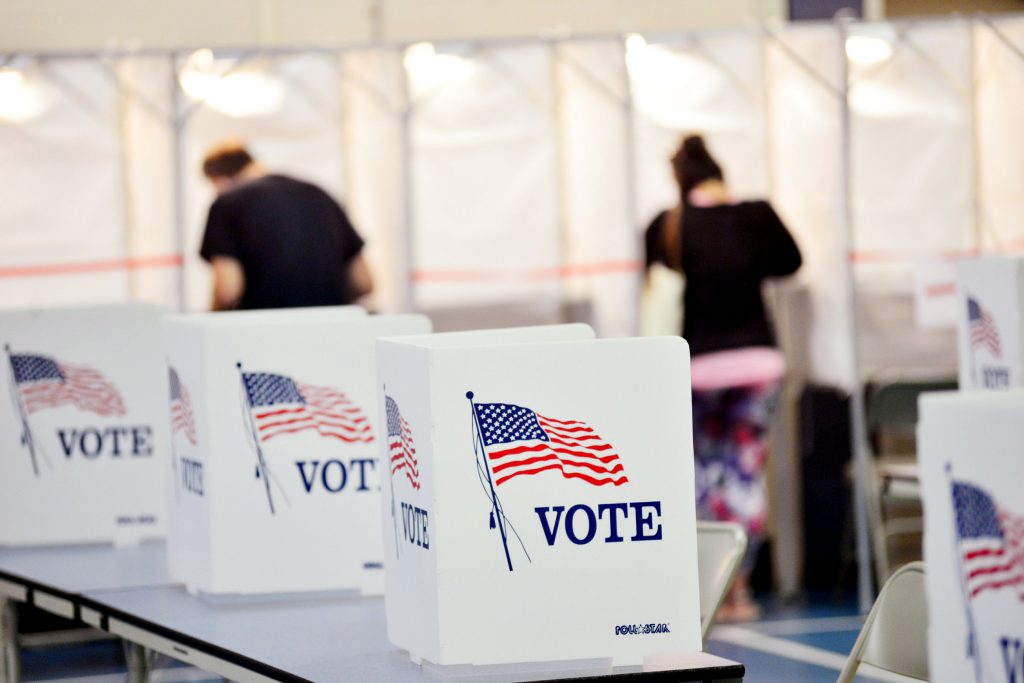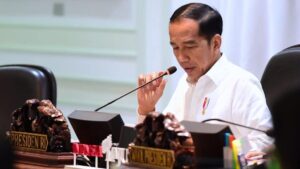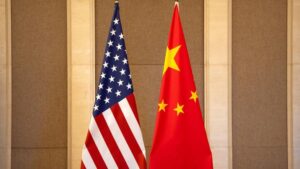The Reflections of Electoral College: A United States’ ‘Democracy’ Way on Election and Its Challenge

Illustration of election day in the United States. Photo: AP
Almost all democratic states will hold the presidential election once in a certain period of time. The people directly vote for the candidate of the president with no representative. But that was never and still is not happening in the US presidential election mechanism. As regulated in the US Constitution Article II Section 1 Clause 2 & 3, America conducts what so-called The Electoral College. “Each State shall appoint, in such Manner as the Legislature thereof may direct, a Number of Electors, equal to the whole Number of Senators and Representatives to which the State may be entitled in the Congress; but no Senator or Representative, or Person holding an Office of Trust or Profit under the United States, shall be appointed an Elector.”
The Electoral College is one of a well-rounded process of the US election system when a group of people, called electors, appointed by each state who formally elect the president and the vice president of the United States. Since 1964, there have been 538 electors in each presidential election. The number of electors is equal to the total voting membership of the US Congress. Those numbers are allocated into 435 House of Representatives, 100 senators, and 3 delegates from Washington DC.
According to Maffucci (2018), the Electoral College is a voting system that was developed at the Constitutional Convention of 1787 and has remained quite unchanged since the ratification of the 12 the Amendment in 1804, which stated that in the event of an electoral tie or no majority winner, the House would vote for the president while the Senate would vote for the vice president.
The US election mechanism is a unique yet anachronistic system that has been maintained by the US government for the past two decades. People in England and Germany also elect the president through representatives. It does not show any democratic spirits that embrace the people to cast their vote directly and imply a one man one vote system. The idea of the Electoral College was established because there were perceptions among Americans that the qualification to vote in the US presidential election is they who can afford to pay the tax.
A global pandemic is causing unprecedented yet multi-layer impact not only on an individual, a group of people, but also a great power state like the US. Last year, the US celebrated its once in four-year democratic party, a presidential election. It is quite challenging and threatening the legitimacy of the 2020 United States presidential election. The US could not run the presidential election mechanism as it should have. The government should reconsider in-person voting to voting by mail or absentee voting. Voting by mail is not a whole new system because they already used this concept in 1993 for several conditions (McNeish, 2005).
Aside from that voting by mail system, the US presidential election mechanism is already vulnerable and controversial because of its Electoral College system. As quoted by Martin Diamond (1977), “The electoral college method of electing a President of the United States is archaic, undemocratic, complex, ambiguous, indirect, and dangerous”. The term ‘archaic’ is the most suitable for explaining the Electoral College system because it is still using the old constitution. The fundamental idea of the Electoral College system came from the Roman Catholic Church. These were proven by most of the founding fathers of the US who graduated from the ancient school (C. Kimberling, 1957).
The existence of the Electoral College amidst the outbreak of COVID-19 and the system of Electoral College makes the US presidential election 2020 turn into a complex yet jeopardy scheme. The government of the US remains to set the election amid the pandemic because it is a federal law mandate that said the election of the president and vice president, one-third of senators, all members of House of Representative, and local officials falls on the first Tuesday in November (Neale, 2015). Nevertheless, the Electoral College has been defended by the government of America because it has been politicized since the first place. They use the Electoral College system as the media to penetrate their interests. When we talk about why the Electoral College still exists, we also talk about the interest of a lot of people.
Aligned with the arguments above, the objection coming from the GOP that is trying to tinker with the Electoral College to boost their chances. Since the 1990s, Republican presidential candidates have won the popular vote only once, George W. Bush reelection campaign 2004 – and Trump victory in 2016. Reported from Bridge Michigan, Jonathan Oosting (2021) stated that the initiative to replace the Electoral College system has been initiated by Republicans with ending the winner-take-all system that won Biden last year.
Besides all those problematic procedures of the US presidential election, the Electoral College remains maintained because it has a legal basis. But, there will be a study or survey that reveals the replacement of the Electoral College (Belenky, 2008). This is also confirmed by John Koza with the National Popular Vote initiative. He added that the Electoral College demonstrates in spades the instability that’s been around the current system for years (Siders, 2021). Therefore, the existence of the Electoral College would be an object of discussion in every study.
Bibliography
Belenky, A. S. (2008). The Good, the Bad, and the Ugly: Three Proposals to Introduce the Nationwide Popular Vote in U.S. Presidential Elections. Michigan Law Review First Impressions, 106, 110–117.
C. Kimberling, W. (1957). The electoral college. Parliamentary Affairs, 11(4), 466–474. https://doi.org/10.5951/mathteacmiddscho.18.2.0118
Diamond, M. (1977). The electoral college and the American idea of democracy. After the People Vote: A Guide to the Electoral College, 22.
Maffucci, M. (2018). DigitalCommons @ UMaine The Electoral College : A System “ for the People ?”
McNeish, J. (2005). Voting by Mail. Canadian Journal of Marketing Research, 22(1), 22–26.
Neale, T. H. (2015). Electoral college reform: Contemporary issues for Congress. Proposals for Presidential Election Reform: National Popular Vote and Electoral College Options, 41–84.
Oosting, J. (2021, April 20). GOP wants to split Michigan Electoral College votes. That would help the GOP. https://www.bridgemi.com/michigan-government/gop-wants-split-michigan-electoral-college-votes-would-help-gop
Siders, D. (2021). GOP fears Electoral College challenge will ‘come back to haunt’ it. POLITICO. https://www.politico.com/news/2021/01/06/gop-electoral-college-challenge-backfire-455204
Ilham Agustian Candra is an International Relations undergraduate student at the Muhammadiyah University of Yogyakarta and also the Co-Founder of Bahas Apa Indonesia. He can be found on social media with the username @ilhamxcandra.





